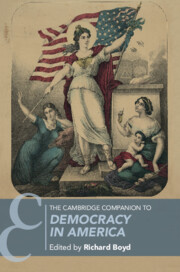Book contents
- The Cambridge Companion to Democracy in America
- Series page
- The Cambridge Companion to Democracy in America
- Copyright page
- Contents
- Contributors
- Acknowledgments
- Chronology
- Abbreviations of Tocqueville’s Major Works
- Introduction
- Part I Sources and Contexts
- Part II Receptions and Applications
- Part III Genres and Themes
- Part IV Democracy’s Enduring Challenges
- 14 Tocqueville’s American Girls
- 15 Picturing American Democracy
- 16 Democracy in America in the Twenty-First Century
- References
- Index
- Series page
14 - Tocqueville’s American Girls
Women, Manners, and the Engendering of Democracy
from Part IV - Democracy’s Enduring Challenges
Published online by Cambridge University Press: 23 March 2022
- The Cambridge Companion to Democracy in America
- Series page
- The Cambridge Companion to Democracy in America
- Copyright page
- Contents
- Contributors
- Acknowledgments
- Chronology
- Abbreviations of Tocqueville’s Major Works
- Introduction
- Part I Sources and Contexts
- Part II Receptions and Applications
- Part III Genres and Themes
- Part IV Democracy’s Enduring Challenges
- 14 Tocqueville’s American Girls
- 15 Picturing American Democracy
- 16 Democracy in America in the Twenty-First Century
- References
- Index
- Series page
Summary
Following Thomas Paine, Edmund Burke, Mary Wollstonecraft, and others, Tocqueville’s Democracy in America regards mores or manners as of the utmost significance for democracy. Tocqueville further attributes to women and especially mothers the primary role of inculcating democratic habits of equality. His portrayals of women in Democracy in America are suggestive of the many ways in which gender, race, and class intersect with one another in Jacksonian America. Looking ahead, Tocqueville also anticipates what contemporary feminist theorist Judith Butler describes as “gender troubles.” In Botting’s view, both Tocqueville and Butler appreciate the complex ways in which women and their sexuality shape the mores and manners that animate the culture of democracy. In Tocqueville’s case, the transformation of American girls from objects of sexual desire coveted by the male gaze to mothers who bear primary responsibility for the transmission of manners takes place between volumes 1 and 2 of Democracy. Botting further suggests that Tocqueville’s shifting attitude toward women parallels his own marriage and an increased ability on his part to identify with the sacrifices of young American wives.
Keywords
- Type
- Chapter
- Information
- The Cambridge Companion to Democracy in America , pp. 369 - 388Publisher: Cambridge University PressPrint publication year: 2022

